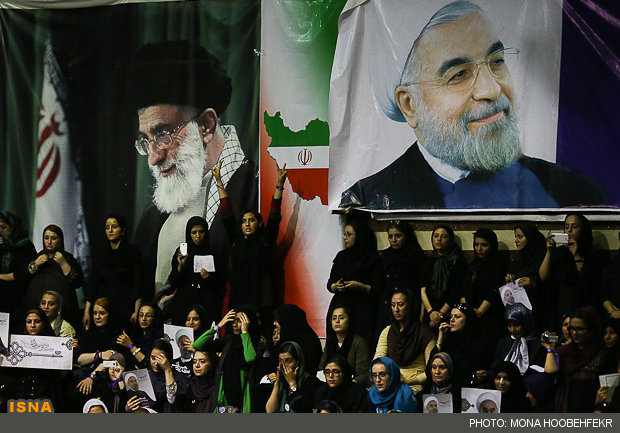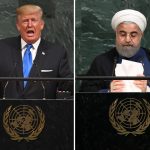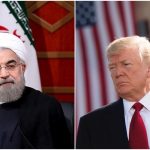by Farideh Farhi & Jasmin Ramsey
Editor’s Note: Following is Jasmin Ramsey’s introduction and interview with Farideh Farhi, an independent scholar and expert on Iran from the University of Hawaii who has been in Tehran since the end of August.
The Iranian President Hassan Rouhani was inaugurated just three months ago and two important historic events have already occurred under his watch: the private meeting between Iran’s Foreign Minister Mohammad Javad Zarif and Secretary of State John Kerry on the sidelines of September’s UN General Assembly in New York and President Barack Obama’s 15-minute phone conversation with Rouhani on Sept. 28.
The hope that was generated in New York — where Rouhani and Zarif effectively presented Iran’s new administration to the world — carried through into the Oct. 15-16 resumed talks in Geneva between Iran and the 6-world power P5+1 team. While all parties have remained officially silent on the details of those talks, Iran, the US and the EU concluded with positive statements.
At the very least, it was obvious that Iran’s new negotiating team, led by Zarif — a well-known diplomat with demonstrable knowledge of the US and how to solve political quagmires — has entered negotiations with a serious plan and intent to resolve the nuclear issue once and for all. Of course, Iran and the P5+1 insist on certain bottom lines and it remains to be seen whether the stars will align in Tehran and Washington enough to allow a deal to happen. With that in mind, I spoke by phone with the Iran expert Farideh Farhi, who’s currently in Tehran, to get a sense of where things stand ahead of the next round of talks scheduled for Nov. 7-8 in Geneva.
Jasmin Ramsey: What is the political environment like in Iran right now in relation to the nuclear issue?
Farideh Farhi: A good part of the Iranian political spectrum is supportive of their nuclear negotiating team’s different approach and efforts for resolving this issue. The folks who are not supportive of this effort are effectively marginalized because of the presidential election’s results; the only argument that they have at this particular moment is: “it’s not going to work.” They’re hedging so that if the talks fail, they can come back and say: “we told you so.”
Does that raise the stakes for the Rouhani administration?
This government has a lot riding on the resolution of the nuclear issue because it made it a campaign promise and priority. Had Mr. Rouhani’s rival, Tehran mayor Mohammad-Baqer Qalibaf, been elected a failure on the nuclear diplomacy front would have posed less of a problem since Mr. Qalibaf’s campaign platform was more focused on the better management of Iran’s economy. But Rouhani’s campaign promise, as well as a quick jump on the nuclear issue, has raised the stakes for him and his foreign policy team (failure on this front may also end up impacting his promises on the domestic front). This is not to say that Rouhani is ready or desperate to make any deal in order to save his presidency or his other agenda items. The Iranian political environment continues to make the acceptance of an agreement that does not acknowledge Iran’s rights under the Nuclear Non-Proliferation Treaty (NPT) impossible. So, the acceptance of a bad deal is politically even more dangerous for Rouhani than not reaching an agreement.
Are the Iranians reasonable in terms of what they are expecting from the other side as part of a mutual deal?
While discussing the complex web of sanctions that have been imposed on Iran, Iran’s Deputy Foreign Minister for Europe and Americas, Majid Takht-Ravanchi, argued that in exchange for Iran’s confidence-building moves, at least one of these sanctions should be removed as a first step. This suggests that Iran will not be asking for the removal of all sanctions immediately, as it has done in the past, but is looking for something that will show a change of direction in the U.S. approach to this issue. A reversal of the sanctions trend is important for selling whatever compromises the Iranian nuclear team makes to its audience back home.
As I mentioned previously, this government has a lot riding on this issue and if it is unable to frame the results of the negotiations as also protective of Iran’s rights, then it will not only be unable to sell the agreement domestically, it will also begin to face serious challenges regarding its domestic agenda.
Can you elaborate?
Mr. Rouhani’s election platform had three prongs. One was related to foreign policy; he promised a reduction of tensions with the Western world at least partly through successful nuclear negotiations. Then there was the economic prong, which has a management component. Against the backdrop of deteriorating economic conditions, Rouhani promised both better management of the economy and more rationalized state support for the private sector and productive activities. Finally, he called for the de-securitization of Iran’s political environment.
The continuation and further tightening of the sanctions regime will force the private sector and producers in Iran to rely even more on the state for protection against a deteriorating economic environment and the challenges of getting around sanctions. It will also increase the threat perception of the political system as a whole and as such make the further easing of political controls more difficult.
What about what’s happening in Iran domestically. Earlier this month the daughter of a key opposition figure, Mir Hossein Mousavi — who’s currently under house arrest — was reportedly harshly harassed by a guard outside of Mousavi’s home. Can movement on the nuclear issue aid the de-securitization of Iran’s domestic environment?
If a movement on the nuclear issue ends up reversing the economic war that has been waged and eliminate the threat of military attack that keeps being issued against Iran, then it is not too outlandish to think of the further opening of the Iranian political system. It should be noted that the high participation rate in the presidential election has already had some impact in terms of reducing the systemic fears that motivated the terribly restricted political environment of the past four years. In other words, on the domestic front the move towards the center, supported by the electorate, has already eased tensions within the country. The removal of external threats is likely to further this process. But if Mr. Rouhani’s foreign policy agenda is blocked by the United States taking a maximalist position, then there is no guarantee that this process will continue. In fact, it is more likely that old fears about outsiders — and particularly the US — trying to foment domestic disturbances will once again resurface.
So President Rouhani definitely wants to relax the state’s hand in the personal lives of Iranians?
He has certainly expressed his desire for a less interventionist state in the personal lives of the citizenry as well as a less repressive state in the treatment of critics and dissidents. His Intelligence Minister even said recently that dealing with security issues through securitizing the political environment is not something to boast about. So the expression of desire and/or pretense is there.
But there has been more than an expression of desire or hope. As I mentioned before, the political environment has also opened up considerably since the election. No doubt hundreds of political prisoners, including former presidential candidates, remain. Abuses such as the one you mentioned regarding Mousavi’s daughters also continue to occur. Just last week, a reformist newspaper was shut down for an article that should have been challenged through a critical engagement rather than shutting down a whole newspaper. Still, I arrived in Tehran two months ago and have yet to meet someone who does not acknowledge a vastly different political environment than prior to the election. This may be just temporary given how bad things were after the 2009 election, but there is nevertheless a palpable and acknowledged sense of relief and political release.
President Rouhani and the Iranian nuclear negotiating team have referenced a limited timeline for reaching a deal. How long do you think it will be before they say too much time has passed?
The process has become accelerated, but I don’t think anyone is expecting the sanctions regime to crumble within 6 months. People have even talked about some sanctions remaining for a long time — they reference the sanctions on Iraq and the time it took for them to be lifted. Nevertheless, there is expectation or hope regarding a reversal of these deteriorating trends.
The bottom line is that a good part of the Iranian population as well as the leadership is ready for a compromise. Under these circumstances, there is readiness for a full-fledged process of give and take and as such, agreements to keep meeting are no longer deemed satisfactory. Hence the expectation that something needs to happen by the next meeting. I don’t think this necessarily means immediate major concessions from either side, but I do think that once the first step is taken, there is no reason why this process cannot become even more accelerated.
In a speech on Sunday, Supreme Leader Ali Khamenei essentially voiced support for Iran’s nuclear negotiating team and told hardliners to hold back for now. Does this signal a shift on his part?
It does not signal a shift, but it does highlight two key elements of Iran’s approach to the nuclear talks. First, his words make clear that despite the noise made by the hardliners criticizing the negotiation team’s softness, excitement, and perhaps even gullibility, Zarif and his aides have full systemic support in their efforts to find a reasonable solution to the nuclear conflict — a solution that addresses both Iran’s bottom lines in relation to the right to peaceful uranium enrichment as well as western concerns regarding potential weaponization. Secondly, Khamenei’s words also made clear that Iran’s approach to negotiations is quite pragmatic. As he said, if the negotiations work, “so much for the better”, if not, Iran will carry on with a more inwardly oriented approach to its development. By giving full support to the negotiating team — led by the very popular Foreign Minister Javad Zarif — the Leader is positioning himself on the side of public opinion, which favors talks, while making sure that the same public opinion eventually does not consider him a stumbling block to a reasonable solution. Such a positioning will make it more likely that domestic public opinion will blame US unreasonableness, egged on by the Israeli government, and not inflexibility or lack of diplomatic acumen of a Zarif-led negotiating team if talks fail.
Do you sense that Iran’s hardliners are willing to support a nuclear deal?
It’s not a question of their willingness; despite the hardliners’ loud voices at this particular moment, they’re marginalized. A systemic go-ahead has been issued for the perusal of some sort of compromise that acknowledges Iran’s right to enrichment despite limitations on the levels and extent. The hardliners will come out of the margins if the Obama administration insists on the maximalist position of no enrichment that is being pushed by Prime Minister Benjamin Netanyahu or is unable to offer any kind of meaningful sanctions relief in exchange for significant Iranian concessions.
So Rouhani is walking a fine line in trying to balance his foreign policy agenda on the nuclear issue with the tricky situation he’s dealing with politically at home?
No doubt, but I would say that at this particular moment, President Rouhani and his team have some leeway regarding how to frame an agreement because of the consensus that was generated by the election. I would even argue that their hands are less tied than President Obama’s, considering Congress’ hardline position on the sanctions regime.
On that point, it’s quite interesting, because on one hand there’s almost a sense among those who are hopeful here regarding negotiations that Obama needs help. But on the other hand there seems to be a tactical urge on the part of others to mirror US policy on Iran. So, while some would like to reduce expressions of anti-Americanism that have long been present in the Iranian public sphere through slogans, posters and so on, others argue that the pursuit of diplomacy while emphatically chanting “Death to America” is Iran’s version of the US’ dual-track policy of sanctions and diplomacy on Iran.
Do you think the taking down of anti-US billboards earlier this month in Tehran is part of that?
Yes, they were taken down by the Tehran municipality and that was apparently on Mayor Qalibaf’s order. I saw smaller versions of those billboards, calling on the Iranian negotiators not to trust the American negotiators, being carried by demonstrators on Nov. 4, the anniversary of the US embassy takeover.
The protest rally in front of the former US embassy was more robust this year as well. Many people showed up or were bused in and instead of avoiding “Death to America” chants, Saeed Jalili, the former nuclear negotiator and presidential contender, made the case that it is perfectly fine to simultaneously negotiate and chant “Death to America.” He added that the chant is not directed at the American people, only at the US government. There was a clear rhetorical play on the US’ dual track of sanctions and diplomacy; the underlying point was that chants of “Death to America” are not directed at the US public in the same way that both the Obama administration and US Congress make the claim that sanctions are not directed at the Iranian people.
There have been several reports recently that foreign commercial actors such as oil companies are thinking about how they could return to Iran in the event of a nuclear deal. Are you seeing any of that on the ground?
Not yet. The sanctions regime is still in full force. I was talking to an Iranian businessman the other day and he told me that he can’t even receive brochures through the mail from German companies because they fear they would be violating sanctions. Of course, he then told me how he gets around that issue byway of Dubai.
Iran’s Oil Minister Bijan Zaganeh has stated that the Petroleum Ministry is re-evaluating its terms and conditions for investment in the country’s oil and gas sector with an eye for offering better terms. He has also acknowledged conversations with some European companies but he said all of this is just at the level of initial talks. So, people do seem to be getting ready for something — the mood for now seems to be that things may work out well because people are also sensing some change in the Obama administration. That said, everybody remains extremely cautious; they know very well that things could also fall apart very quickly.
Photo Credit: ISNA/Mehdi Ghasemi






Fine assessment. John Kerry and other American leaders have to convince the Iranian leadership that the US genuinely seeks a “change of direction” and steady improvement in America’s relations with Iran. If a deal is made.
Rouhani let the Financial Times know that he seeks up to $100 billion in western investment in Iran’s oil and gas industries. This would be a very good thing, if it can be achieved.
Hagel in his Senate confirmation hearings inadvertently let slip that Obama does not intend to stop the Iranians and has instead decided to adopt a ‘containment’ strategy after Iran gains nuclear capability.
Such a containment strategy will not address the nuclear proliferation through the region that will consequentially result from Iran getting its hands on nukes. Nor will it prevent Iran from adopting much more aggressive terrorist tactics, relying upon its nuclear umbrella to eliminate military retaliation as an option.
Obama relying upon containment and deterrence when confronted by a fanatical, nuclear armed Jihadist state is not mere incompetence, it is in the clearest of terms, dereliction of duty. It is literally inviting disaster to happen.
A good article, looking down the road. A peaceful resolution will return benefits on the plus side, not the boogieman’s scenes so often sited by those who have motives that require a continual agitation of the M.E. The bigger picture is what a peaceful solution brings to not only the M.E., but also to the dilemma in the energy sector in Europe.
Wrong. Zero chance Obama would allow Iran to build nukes, in my view. Zero.